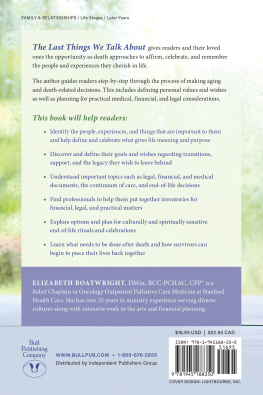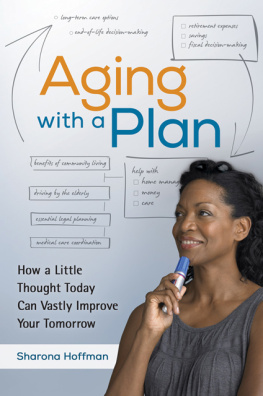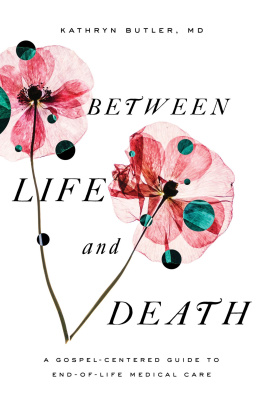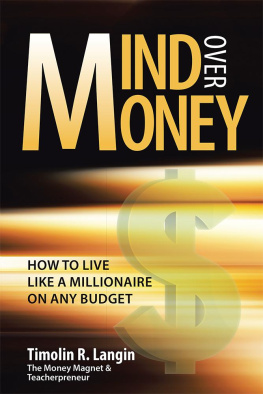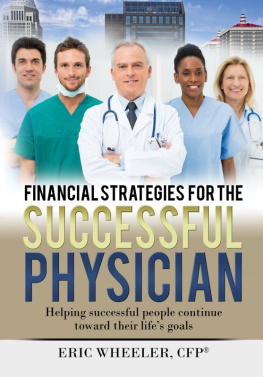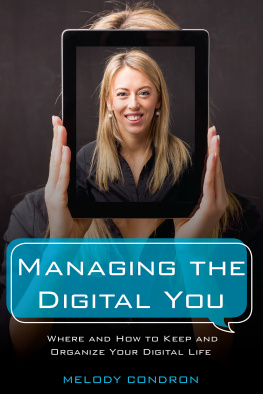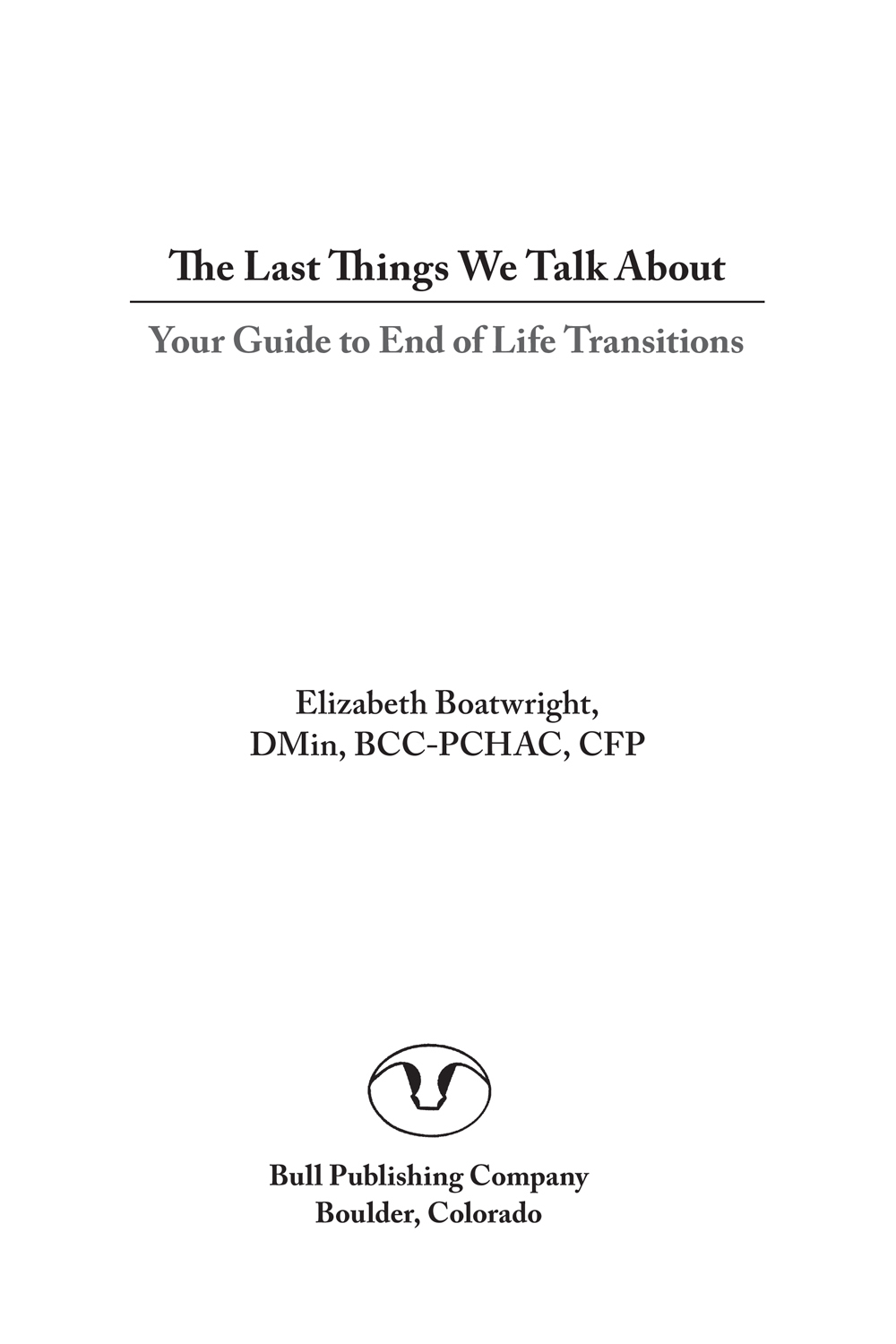
Copyright 2021 by Elizabeth Boatwright.
All rights reserved. No part of this publication may be reproduced, distributed, or transmitted in any form or by any means, including photocopying, recording, or other electronic or mechanical methods, without the prior written permission of the publisher, except in the case of brief quotations embodied in critical reviews and certain other noncommercial uses permitted by copyright law.
Bull Publishing Company
P.O. Box 1377
Boulder, CO USA 80306
www.bullpub.com
Library of Congress Cataloging-in-Publication Data
Names: Boatwright, Elizabeth, author.
Title: The last things we talk about : your guide to end of life transitions / Elizabeth Boatwright, DMin, BCC-PCHAC, CFP.
Description: Boulder, CO : Bull Publishing Company, [2021] | Includes bibliographical references and index. | Summary: Whether we like it or not, we all die. People avoid talking about death because it is too mysterious, too dark, and occasionally, as in the case of an accidental or other sudden death, too unpredictable. Because we do not discuss death and dying in our current culture, people are left to wrestle with large questions about death. This book is a place to start thinking about, and preparing for, this inevitable event. The primary goal of The Last Things We Talk About is to help readers affirm, celebrate, and remember the people and experiences they cherish in this life. It encourages them to seriously consider their death and take planning one step at a time, according to their schedule, and as energy permits. Elizabeth Boatwright, DMin, BCC-PCHAC, CFP is a Relief Chaplain in Oncology Outpatient Palliative Care Medicine at Stanford Health Care. She has over 25 years in ministry experience serving diverse cultures along with extensive work in the arts and financial planning--Provided by publisher.
Identifiers: LCCN 2020048001 (print) | LCCN 2020048002 (ebook) | ISBN 9781945188350 (paperback) | ISBN 9781945188367 (ebook)
Subjects: LCSH: Death. | Death--Planning.
Classification: LCC HQ1073 .B63 2021 (print) | LCC HQ1073 (ebook) | DDC 306.9--dc23
LC record available at https://lccn.loc.gov/2020048001
LC ebook record available at https://lccn.loc.gov/2020048002
Printed in the U.S.A.
26 25 24 23 22 2110 9 8 7 6 5 4 3 2 1
Interior design and production by Dovetail Publishing Services
Cover design and production by Shannon Bodie, Bookwise Design
to Frank
Guide to Key Pages
If you or someone you love has recently received a serious/terminal diagnosis, turn to pages 7, 10, 12, 59
If you need to facilitate conversations about end-of-life matters with loved ones, turn to pages 20, 23, 26
If you want to identify meaning and purpose in your life and learn how to tell your story, turn to pages 9, 12, 50
If you need more information on the health care system and continuum of care, turn to page 31
If you are looking for housing alternatives that accommodate aging populations, turn to pages 29, 33
If you are downsizing/moving or helping a loved one move or pack up a home, turn to page 45
If a friend, family member, or loved has received a serious/terminal diagnosis and you want to know how best to support them, turn to pages 121, 131
If you are planning a funeral/memorial for yourself or someone else, turn to page 157
If you are looking for digital, virtual, or ecological options relating to end-of-life issues and burial plans, turn to pages 97101
If you need to learn more about body disposition options, turn to pages 80, 95, 142, 152
If you need to get your end-of-life financial/legal paperwork in order, turn to pages 75, 88
If you have been asked to be a health care proxy, turn to page 7576
If you have been asked to be a personal representative and would like a checklist, turn to page 148
If you want to learn more about end-of-life practices in other cultures, turn to pages 221234
If you are losing, or have lost a loved one, and are working though the mourning process, turn to pages 170174
If you have medical bills and you need help understanding them, turn to pages 71, 73
Contents
Acknowledgments
As this book has been over 15 years in the making there are countless people to acknowledge:
To my amazing family: husband, Frank; sons, Stephen and Floyd, and their families; my sisters and brother, Sally, Suzanne, and Dave, and their families. You are, along with Christ, the rock I stand on. Without your prayers and support, this book would still be in a box waiting for someone to say yes.
To the original team of the class The Last Things We Talk About at Lake Grove Presbyterian Church, Pastor Bob Sanders, Ron Bailey, JD, and Frank Boatwright, LCSW, who laid the groundwork for the book.
To the more than 800 participants at Lake Grove Presbyterian Church in Lake Oswego, Oregon, and First Presbyterian Church of Sunnyvale in Sunnyvale, California, who helped to critique and shape the class over the past 15 years.
To friend Patty Moorhead who developed the manual inventory Final Wishes to augment the work in the classes.
To Rev. Dr. Dan Chun, my mentor, and his spouse, Pam Chun, founders of Hawaiian Island Ministries and leaders at First Presbyterian Church in Honolulu, Hawaii.
To those consultants and readers who assisted in review and accuracy: Rev. Petra VanderWater, The Venerable Zhiyun Cai, Mahesh Bhavana, Bill Futornick, Chaplain Taqwa Surapati, and Fr. Randy Valenton, Peter Johnson and Dr. Christine Keeling.
To department chair Lori Klein and the chaplains in Spiritual Care and the social workers, doctors, AP nurses, administrators, counselors, and technicians in Palliative Care at Stanford Health Care for their continuing compassion and trailblazing work in caring for the seriously ill inpatients and outpatients we all love.
To those who did say yes: author Dr. Kate Lorig, the catalyst who introduced me to Jim Bull; editors Erin Mulligan and Julianna Scott Fein; and the staff at Bull Publishing. Thank you. The adventure is just beginning.
Introduction
Whether we like it or not, we all die.
Some of our bodies are placed in the ground with a solemn ceremony, some cremated into ashes with a short eulogy followed by a wake or a good party. Still others may be transformed into an ice cube for eternity (or until a cure is found). In our modern Western world, we have found every conceivable way of not talking about death because it is too mysterious, too dark, and, on occasion, as in the case of an accident or a sudden death, too surprising and unpredictable. Talking in general about anything serious may be on the decline, as many of us have become devoted exclusively to social networking at the expense of face-to-face conversations. And with the continual decline in church, mosque, and temple attendance, more and more people are left to wrestle with questions about death without any knowledge of the traditions of our ancestors or any idea where to start.
So we brood over our approaching demise, assuming we have no power over the time, place, or way we will meet our end. Some of us pay for every conceivable potion and lotion to retain our youthful glow or figure, only to discover that under our youthful guise, our internal workings and health are in decline and we are out of balance. We ponder the countless movies and novels on the mysteries of death. We may puzzle over the romantic Western inclinations of the nineteenth century to die by suicide or the burial traditions of various indigenous cultures. But we often still cant find what we are looking for. And, especially as the millions of baby boomers approach their retirement years, the following become all too common questions: How do we do this thing called death? How do I put my house in order? Whats next after a loved one dies?

